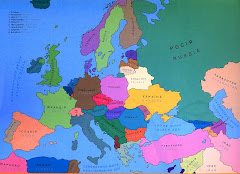 New house and new room, with high ceilings, entrance in back of house, up flight of stairs to a lovely porch; Natalia in pink and white with Tonya, Olga and two Lydas, friends of Natalia's, having tea in the living room. And my guitar man.
New house and new room, with high ceilings, entrance in back of house, up flight of stairs to a lovely porch; Natalia in pink and white with Tonya, Olga and two Lydas, friends of Natalia's, having tea in the living room. And my guitar man.

Post Office Drama: The ladies at the post office all know me by name: “It's Francie. Anything from America?” they shout back and forth. The answer is usually no. I greet them with big smiles, and they do the same. It's interesting because I've had nothing but bad experiences at the Post Office: lost mail, slow mail, no mail, returned mail, and postage due mail for my not picking up a box of books soon enough! I have smiled through it all, however, and now I am rewarded with warm greetings everytime I go into the Post Office. Something I dreaded has turned into something I enjoy, but I don't expect to get any mail any more, unless it comes from the Peace Corps in Kyiv. Anything from America remains iffy. This is not to discourage you from sending a card every now and then, however. I think it would please the ladies in the Post Office, too! Send to me c/o of Vera Flyat, A/R 14, Starobelsk, Lugansk Oblast, Ukraine 92700 (I notice Vera using this zip code now).
Stray dogs: There is a stray dog problem here as elsewhere in Ukraine, and we were warned how to deal with the dogs if they are aggressive. Mostly they bark but then back off as you pass. I got nipped once in the back of an ankle as I walked through the park to Victoria's, but that’s the only time it’s happened. Recently, a dog has adopted me, wagging its tail whenever he sees me coming around the bus station. I’ve taken to carrying cookies or pieces of bread in my pocket to toss at him, and then we both go on our way. I don't know if this is a good thing or not. I wonder what he will do in winter, for instance, but these scruffy dogs seem to survive, often wander in packs, and find comfort I suppose in one another. At least I like to think so.
A plant for Luba: I returned to Luba’s recently to drop off her house keys and pick up shoes I had left behind, and a few other things, and to bring her a pretty plant I had bought as a present. She loved the plant, as I knew she would, and immediately put it in the window of what used to be my room. “Fran’s plant,” she said with a smile. We sat at the computer for a few minutes to say we will always be friends. I felt so much better after seeing Luba, and letting her know how much I care for her. And I know she feels the same way. Friendships are not always easy, but they are always important to our souls.



 and crafts, making origami pumpkins (easier than peace cranes), boxes, tiny flowers and animals.
and crafts, making origami pumpkins (easier than peace cranes), boxes, tiny flowers and animals.







































